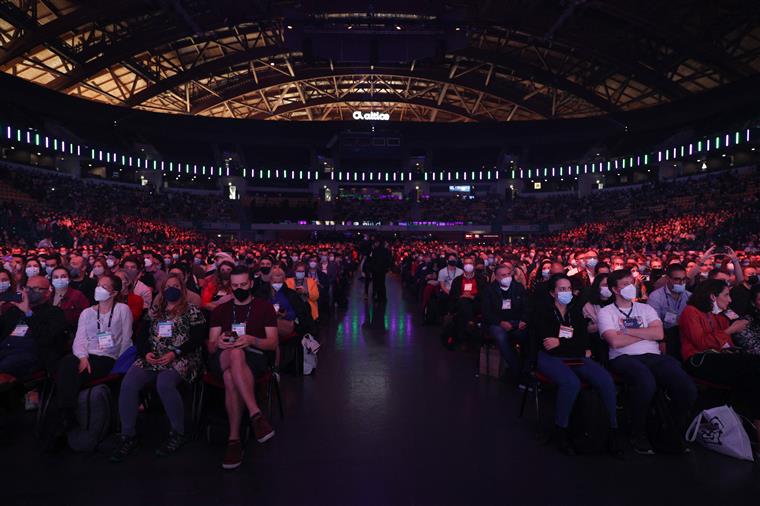Eleven million euros. This is the amount paid annually to the Web Summit organization for the event to be held in Portugal. If we consider that the event will actually remain in the Portuguese capital until 2028, the value amounts to a total of 110 million euros in compensation borne by the state and the Lisbon City Council, through the Lisbon Tourism Development Fund and the Ministry of Economy.
But let’s get to the numbers: during the four days of the 2021 edition, more than 59,000 purchases were made at the venue, with an average consumption of 10.33 euros.
According to information from SIBS, cards of 100 different nationalities have been used in the Tech Summit Spaces. In all, 73.7% of the consumptions were made by foreigners and 26.3% by Portuguese. Among the consumptions made by foreigners, the highlight goes to the United Kingdom (10.5%), followed by Germany (7.4%), Brazil (4.8%), Ukraine (4.4%) and Poland (3.7%).
With regard to purchases and withdrawals in the province of Lisbon, there was an increase of 4.2% in the number of transactions compared to the 2019 version, and with regard to transactions exclusively with foreigners, there was also an increase of 18.6%. At 1:51 pm (Lisbon time) on November 2, the second day of the summit, the peak of transactions was reached.
By sector of activity, supermarkets (31.3%) ranked first in the list of the largest number of verified purchases, followed by restaurants and the like (23.3%), gas stations (5%), and fashion and accessories (4.1). %).
In terms of length of stay in Lisbon for foreigners who visited Web Summit 2021, most chose to stay only during the days of the event (65.8%), while 34.2% have been in Lisbon since the previous weekend.
This edition, returning to the face-to-face format, received 42,751 visitors from 128 countries. The total number was, however, lower than that recorded in the last personal edition, in 2019, when 70,469 people participated.
Until we see that it is not known for certain the economic impact of the summit on the country, however, according to Economy Minister Pedro Sisa Vieira, the immediate return is “very positive” and fully justifies the national effort, but this value is less than expected.
These statements by the government official came after the disclosure of a new assessment by the Office of Studies and Strategy at the Ministry of Economy, on Wednesday, that downplayed the short-term financial impact of the event. According to this new analysis by researchers from the University of Minho, whose direct impact review covers the years 2016, 2017, 2018, and 2019, that is, the four versions that existed before the pandemic, the numbers are lower than estimated in the first assessment published in 2018. One explanation This drop is the participants’ expectations cut, which was made three years ago.
Initially, the growth rate of visitors was expected to increase from year to year, indicating an average influx of about 80 thousand people, which never happened. In 2019, the turnout was 10,000 less than expected. The estimated turnout for 2018 and the actual number showed a difference of about 11,000 visitors.
Thus, with fewer visitors, the immediate financial return is also lower than initially expected. As the downward revision worsens the average estimated expense. The value now calculated is 1.98 € per day less than the value indicated at the beginning.
The results of this latest study also reveal a downward correction in employment revenue and taxes collected by the state. In 2019, the equivalent annual employment was 1,692 jobs and not 2,911, as calculated in the first study. Income from income taxes was 14.7 million, not 35.8 million.
Between the increase in productive wealth estimated at €141.5 million for 2019 and the 69.8 million now calculated for that year, based on revised data, there is a difference of €71.7 million, which is equivalent to a reduction of about 50%.
Despite the downward revision, the immediate return to the Portuguese economy remains well above the costs – 11 million euros mentioned.
“What this study shows is that the direct effect of the web top, both in terms of employment, in tax revenue and the volume of demand induced in the economy, is a very positive effect in all aspects, showing that the direct return is more than justifying the investment we are making,” Siza Vieira insisted, noting that there are “indirect effects,” “which are difficult to measure,” but, in the minister’s opinion, they must be taken into account, because “everyone knows about the cases of visitors who come and invest [no país] After getting a better perception of the country.”
According to a study conducted by the European University, the Portuguese are aware of the impact of the Web Summit in Lisbon and support the event. In the results of the Survey of the Effects of the Web Summit on the Economy and Tourism in Lisbon, 93% believe that the recognition of the international image (89%) and reputation (84%) of Portuguese capital is increasing.
The majority of respondents also answered that they trust the decisions taken by the government for tourism regarding event development (71%) and efforts to include the tourism industry in the tourism event planning process (62%).
In addition, more than half of the respondents (54%) answered that they agreed with the statement “Web Summit strengthens the cohesion of the tourism industry in Lisbon”.
This study was conducted between October 17-25, 2021, with a total of 322 people.

“Wannabe internet buff. Future teen idol. Hardcore zombie guru. Gamer. Avid creator. Entrepreneur. Bacon ninja.”

